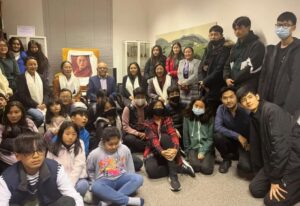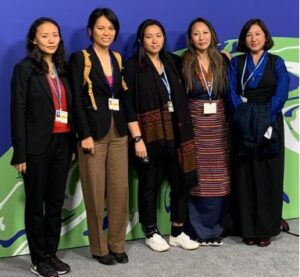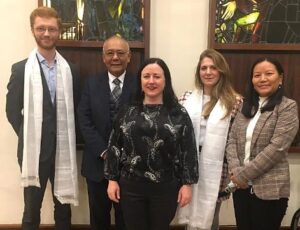
Tibetan delegation at COP 26 with Representative Sonam Frasi and Tibetan students at the talk
Photo: CTA
The Tibetan environmentalists team have followed up their participation in COP26, the United Nations Climate conference held in Glasglow earlier this month, with a continuing awareness raising programme which has included virtual discussions and in-person climate talks to youngsters.
The Office of Tibet, London, and the Tibetan Community in Britain held a talk Introduction to Tibetan Environment and Climate Change targeted at Tibetan students and other young people in the UK, to give them the opportunity to hear directly from Tibetan climate researchers and advocators. The organisers said the aim of the event was to increase awareness about the importance of the Tibetan Plateau and its global implication, and the need for young Tibetans to take part in the campaign to promote the importance of Tibet’s environment.
Dechen Palmo, Research fellow at the Tibet Policy Institute (TPI) at the Central Tibetan Administration (CTA); Tenzin Choekyi, Senior Researcher at Tibet Watch, the UK based sister organisation to Free Tibet which works to promote the human rights of the Tibetan people through monitoring, research and advocacy; Lobsang Yangtso, Research and Campaign Assistant at the International Tibet Network (ITN) and Ms Pema Dolma, campaign director of Students for Free Tibet (SFT) were invited to speak.

Tibetan delegation at COP 26: Tenzin Choekyi (Tibet Watch), Palmo Tenzin (International Campaign for Tibet), Pema Doma (Students for a Free Tibet), Dechen Palmo (Tibet Policy Institute), Dr Lobsang Yangtso (International Tibet Network)
Photo: Facebook
Dechen Palmo’s talk The Tibetan Plateau, Why It Matters highlighted the impact of climate change on the Tibetan Plateau. Tenzin Choekyi spoke of the human rights situation inside Tibet through her presentation Poverty, Protest and Prison: A case study of Dzawonpo, Karze Kham in Tibet. Lobsang Yangtso spoke on the significance of COP26 to Tibet and shared her experience of attending Glasgow COP26. Pema Dolma spoke on climate justice and role of young Tibetan activists in spreading the word about Tibet’s climate crisis at global climate discourses.
Two separate panel discussions were held, focussing on the role of Tibet in the global climate system, with panellists including experts from different backgrounds. The Tibetan team carried out many awareness-raising side events. Dechen Palmo, Dr Lobsang Yangtso and Tenzin Choekyi were invited to speak at the Universities of East Anglia, Oxford and Westminster.
The Asia Scotland Institute held a webinar The Third Pole: How Climate Change is Affecting the Tibetan Plateau on November 11, with a panel discussion on the topic of Asia being the centre for some of the most serious problems and also the solutions for climate change.
The COP26 Tibet team, along with large number of Tibetan community members in the UK, joined 100,000 protestors at the People’s March in Glasgow on November 6, demanding climate justice for Tibet.

Ross Greer MSP (CPG Co-Convener), Sonam Frasi (Representative of the Dalai Lama), Eleanor Byrne-Rosengren (CPG Secretary), Mercedes Villalba MSP (CPG Co-Convener), Tsering Tsomo (Office of Tibet)
Photo: Facebook
Mr Sonam Tsering Frasi, Representative of the Office of Tibet in London, along with a member of his staff, Ms Tsering Tsomo, attended COP26 representing the Tibetan people and participated in many side events and live talks. They met Member of the Scottish Parliament (MSP) Ross John Greer of the Scottish Green Party and MSP Mercedes Villalba of the Scottish Labour party at the Global Green Hub in Glasgow. Mr Frasi thanked them for their continued support and for hosting meetings with other members of their Parties to discuss ways of raising the Tibet issue in Parliament.
The Scottish Parliamentary Cross-Party Group on Tibet (CPGT) issued a statement,“As COP 26 draws to a close in Glasgow, the cross-party group is disappointed by the lack of official Tibetan representation at the conference, the lack of sufficient progress or a convincing sense of urgency, and the lack of any real solutions for the climate crisis in this strategically critical part of the world. However, the group was delighted to see a strong Tibetan advocacy delegation working in partnership with each other and with the Central Tibetan Administration. We commend the briefing paper issued by the Tibetan delegation” . CPGT issued the following policy recommendations for climate justice in Tibet:
- Recognise the strategic and ecological importance of Tibet and the wider Tibetan Plateau, acknowledging its unique biodiversity, its impact on regional weather patterns and its place at the heart of food and water security in Asia
- Improve access and transparency in scientific research on climate change, with particular focus on encouraging the inclusion of Tibetan experts in collaborative work
- Adopt a rights-based approach which empowers and engages frontline communities and respects the value of traditional knowledge
In the run-up to COP26, early in 2020, the CPGT initiated the Third Pole Climate Inquiry and commissioned the Scottish Centre for Himalayan Research (SCHR) to look into the causes and impacts of climate change in Tibet and the wider Third Pole region. The SCHR compiled their research in a working paper and later produced a full report. The cross-party group then issued a statement, highlighting the importance of the issue and calling for Tibet’s climate crisis to be on the agenda at COP 26.




 Print
Print Email
Email